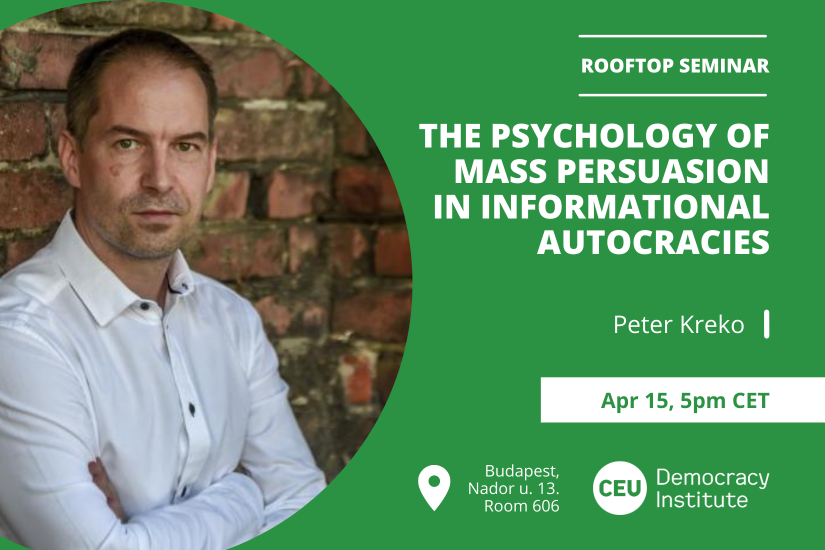
The De- and Re-Democratization (DRD) Workgroup of the CEU Democracy Institute cordially invites you to its next Rooftop Seminar. You can check our past events here.
If you would like to attend, please register here.
Please keep in mind that external guests cannot enter the building without prior registration. Due to space restrictions, attendance is limited. We ask registered visitors to pick up their temporary visiting card at the reception. The event is not open to the press.
The paper is available upon request from the author, who wrote it as a GMF Engaging Central Europe Visiting Fellow, under the umbrella of the Neo-authoritarianisms in Europe and the liberal democratic response (Authlib) project.
If you would like to receive updates about our events, sign up for the DRD mailing list here.
Abstract:
In the contemporary landscape of information control and manipulation, the phenomenon of "spin dictatorships” or "informational autocracies" emphasized the importance of the cooperation of state actors and technological firms in perfectuating mass persuasion. This paper analyzes the mechanisms through which autocratic and semi-autocratic regimes, leveraging advanced technological tools far beyond those available to 20th-century totalitarian states, exert influence over public opinion and maintain control. Through a comparative analysis of the United States and Hungary the study illuminates the psychological underpinnings that drive individuals to not only accept but actively support disinformation and propaganda, underscoring the demand for deceit in both democratic and non-democratic settings. The paper challenges the conventional democracy-autocracy dichotomy in the context of mass persuasion, revealing a blurred line where both regimes exploit media fragmentation, polarization, and advanced technologies to cultivate environments in which informational autocracies can operate well. By highlighting the role of "tribal politics," the research further explores how collective identity and societal polarization contribute to the receptivity and spread of disinformation. The findings suggest that the success of spin dictatorships depends not only on their ability to monopolize information but also on their capacity to tap into deep-seated psychological needs for belonging, pride, and identity. The paper concludes with a call to reevaluate traditional notions of dictatorship and democracy in the age of information manipulation, emphasizing the need for strategies that address both the supply and demand sides of disinformation.
Speaker:
Peter Kreko is a social psychologist and a disinformation expert with a focus on the psychological drivers of belief in disinformation and the impact of political-institutional contexts. He holds a PhD from the Eötvös Loránd University of Sciences, where his dissertation topic was the social psychology of conspiracy theories. He is a Research Affiliate at the CEU Democracy Institute, a senior fellow at the Washington-based CEPA think tank, and a PopBack Fellow at the University of Cambridge. He has also worked as a guest researcher at the Institute for Human Sciences in Vienna and as a non-resident Associate Fellow at the Johns Hopkins University SAIS Bologna Institute of Policy Research. In addition, he has served as a Fulbright Visiting Professor at Indiana University and is the owner and director of the Political Capital Institute. Kreko is also the head of the EC-funded hub against disinformation (HDMO-Lakmusz).
Discussant:
Alexander Bor is a postdoc at the CEU Democracy Institute's Research Group on De- and Re-Democratization and a Visiting Professor at CEU Vienna. He received an MA in Political Science at the CEU in 2012, and a PhD in Political Science at Aarhus University in 2018, where he also worked as a postdoc until 2022. His research focuses on how the human mind navigates social and political challenges like political polarization, online political hostility, the COVID-19 pandemic, or selecting and evaluating political leaders. His work integrates insights from political behavior, social and evolutionary psychology, and public health. He employs diverse quantitative analytical tools like surveys, experiments and machine learning. His work has been published in leading journals (including PNAS, APSR, and Psych Science) and covered by international media outlets (e.g. New York Times, Washington Post, The Atlantic). At CEU, Alexander will teach courses on quantitative research methods.
Chair:
Flóra Hevesi is a research assistant at the CEU Democracy Institute. She holds an MA in public policy (2023) from Central European University and a BA in international relations (2019) from Corvinus University of Budapest. During her studies, she was a member of Rajk College for Advanced Studies, where she attended additional courses on methodology, social sciences and philosophy. Her research interests lie in the field of democratic, civic and environmental engagement, education and political philosophy. Before joining the Democracy Institute, she worked as a student consultant for the International Press Institute and junior analyst for 21 Research Center.